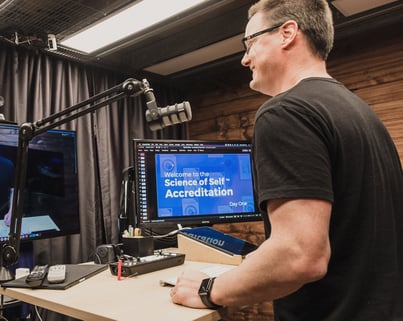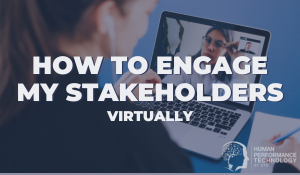The Virtual Facilitator versus The Virtual Producer
Are you still using the first 5 minutes of every virtual meeting getting technology set up correctly? “Lisa, Can you hear me? Can you see my screen?” Or perhaps it’s the most common phrase from 2020: “You’re on mute!”
The coronavirus outbreak prompted a surge in remote working and online collaboration. Subsequently, virtual facilitation is now a fairly critical skill for all employees. In fact, it’s awe-inspiring to have a virtual meeting go completely and utterly smoothly! So, how does that happen? Let’s look at the roles of the virtual facilitator and the technical producer.

The Virtual Facilitator
Some of the common settings for a virtual facilitator are in:
- Meetings (1 hour or less; ideal with 10 attendees or fewer who are all contributors)
- Webinars (1 hour or less; can have hundreds of attendees; ideal for lecture-style delivery with some use of the chat feature)
- Workshops (multiple hours with breaks; ideal with 20 attendees or fewer; engaging activities; interactive technology; Q&A)
- Training Sessions (multiple short learning segments with days in between to “practice”; typically pre-recorded but can be live; if live, the sessions would look similar to a workshop; incorporates short quizzes)
Broadly speaking across these different settings, the facilitator’s role is to prepare, lead the conversation or presentation, achieve an action or outcome AND NOT to have internet issues that cause the screen to freeze or drop out, AND NOT to mess up the break-out rooms, AND NOT to miss important questions in the chat feature, AND FRANKLY NOT to use the first 5 minutes after the start and every break to reset the technology.
Digital literacy is important for facilitators, but it wasn’t always required. Some people will pick it up, but some people are still struggling. It’s time to get a Technical Producer!
The Technical Producer
The role of a technical producer is to handle all the background aspects of the virtual session, which allows you, as the facilitator, to focus on the REAL job at hand.
The technical producer needs to be experienced with your virtual online facilitation product, as well as your camera and microphone products. The producer should also have a Plan B agreed with the facilitator in advance of the session.
The producer should generally understand the topic of the session to support with managing questions from the chat feature and supporting interactive activities. The producer doesn’t necessarily have to interact with the attendees as a co-facilitator would, although that’s an acceptable approach too.
Bringing in a producer may not make sense for just a small group of people; however, as the size of the group grows, so does the risk of certain individuals having problems that can divert the facilitator’s attention and bring the session to a grinding halt.
Top 10 Key Duties
An outline of possible duties carried out by the facilitator versus the producer is shown in the table below.
| Virtual Facilitator | Technical Producer |
| Greets participants as they enter the virtual room to build rapport | Checks off attendance and contacts any 'no shows' (if appropriate) |
| Discusses the agenda and ground rules for the session | Ensures participants are set up without any video/audio issues |
| Explains the session activity, purpose and which digital feature will be used | Provides support via chat, text or phone on the digital feature |
| Delivers learning content | Monitors the chat feature for comments and questions |
| Keeps the group on track | Provides attention to one individual |
| Selects or clicks the relevant link in the presentation | Prepares all files, links, videos, music and other tools in advance; Conducts a dry-run before the session |
| Asks the group to participate in a poll | Opens, manages and closes poll; Shares the data to the group |
| Interacts with the group | Interacts with the facilitator (e.g. brings relevant issues to the facilitator's attention) |
| Solicits feedback throughout the day | Documents responses and actions |
| Reflects on performance after the event and implements changes | Provides pointers, suggestions and a second opinion on the event |
Good luck in your next session, and remember to consider how audience expectations differ in virtual facilitation.
TTI Success Insights, our partner in psychometric assessments, is pleased to share the FULL GUIDE for virtual facilitation: 13 Critical Tips for Facilitating Better Online Workshops Plus 11 Must-Have Software Features for Virtual Meetings!

Trevor O'Sullivan
General Manager. Since the early 2000s, Trevor has worked with thousands of Talent Management professionals to develop and apply assessment-based talent management solutions for selecting, developing and managing people. Trevor is an active member of the TTI Success Insights (TTISI) Global Advisory Council, contributes to TTISI product development and is a regular presenter at TTISI-R3. He is honoured to have received multiple Blue Diamond Awards and, more recently, the Bill Brooks Impact Award recognising his contributions to the TTISI global network.



We Would Like to Hear From You (0 Comments)